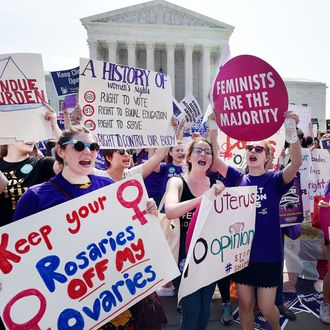
It’s a case involving fairly obscure medical procedures and complex standards for judicial rules, but the significance is clear enough: In a 5–3 decision in Whole Woman’s Health v. Hellerstedt, the U.S. Supreme Court struck down a Texas law imposing “health” restrictions on abortion clinics that threatened to shut most of them down. In doing so, the Court effectively put a stop to a whole wave of similar state laws that had become the latest tactic for ending legalized abortion.
Since the Republican state legislative and gubernatorial landslides of 2010, a couple of new approaches to restricting or even prohibiting abortions have arisen. Probably the best known are “20-week bans” that seek to move the point in pregnancy when a right to abortion is no longer presumed, from fetal viability to some earlier juncture. But the most effective have probably been so-called TRAP laws: Targeted Regulation of Abortion Providers. Texas adopted a classic TRAP statute, requiring in bland and professional-sounding language that doctors who perform abortions must have admitting privileges at nearby hospitals, and that facilities where abortions are performed must meet standards for surgical hospitals. Though couched as a health and safety improvement for women seeking abortions, the law is really aimed at shutting down abortion clinics, and over half of the clinics in Texas have in fact closed since the law came into effect.
A federal district judge struck down the Texas law, but the conservative Fifth Circuit Court of Appeals reversed that decision. And so the Texas law was the first of its generation of TRAP laws to reach SCOTUS, with others (notably Louisiana and Mississippi) waiting in the wings.
It has been assumed for years that Justice Kennedy would be the swing vote in a decision on TRAP laws and indeed in the direction of the Court on abortion jurisprudence. He supported Justice O’Connor’s plurality opinion in the 1992 Planned Parenthood v. Casey case that upheld a constitutional right to abortion, but then allowed state regulation of abortions even in the first trimester if they did not impose an “undue burden” on that right. More important, Kennedy gave a green light to state abortion restrictions justified as needed to protect the “health of the mother” — up until then usually grounds for an exception to restrictions — in a 2007 decision (Carhart v. Gonzales) upholding a federal ban on so-called “partial birth” abortions. That’s precisely the signal states like Texas have responded to in finding innocuous-sounding medical rules for clinic “safety” that would shut many of them down.
So if there’s a surprise in today’s decision, it’s that Kennedy concurred with Justice Breyer’s majority opinion adjudging both of the Texas law’s main provisions as violating the “undue burden” standard. That means the same result would have occurred even if Justice Scalia were still alive and on the Court. Had Kennedy gone the other way with a seat on the Court vacated, SCOTUS would have deadlocked 4–4, and the Texas law would have remained in effect thanks to its validation by the Fifth Circuit.
Justice Thomas, who has long openly opposed any constitutional right to choose, dissented, along with two other pretty sure votes to reverse Casey and Roe v. Wade, or at least open things up to very significant state restrictions without much judicial scrutiny, Chief Justice Roberts and Justice Alito.
All of this suggests that the wave of TRAP laws will, for the moment, be turned back. More fundamentally, it shows that the anti-abortion movement is two justices away from being able to win its war against reproductive rights. If Donald Trump is elected president, one will likely be supplied by his appointment to replace Scalia. A second could be the ball game, if the retiring or expiring justice is one of the five who struck down Texas’s law today. And if Hillary Clinton is elected president, the right to an abortion is probably going to be reasonably secure for the foreseeable future.






























